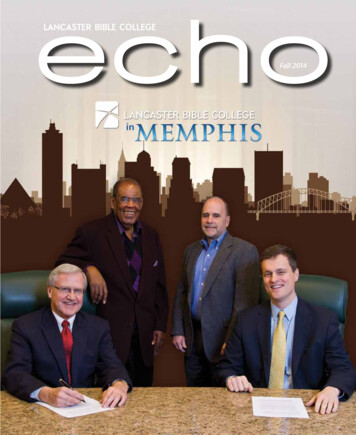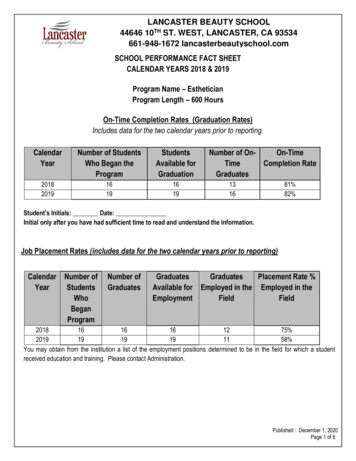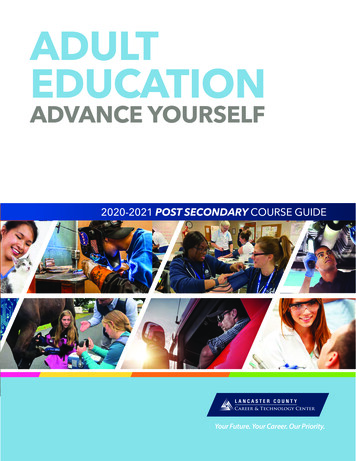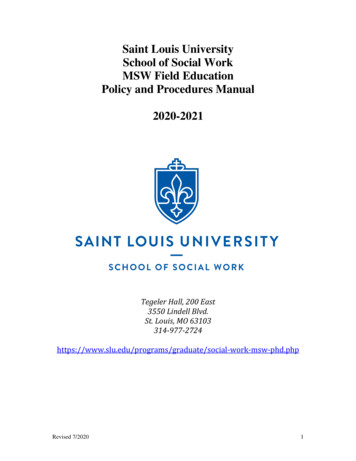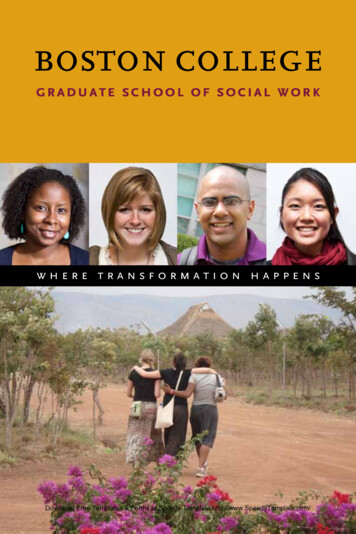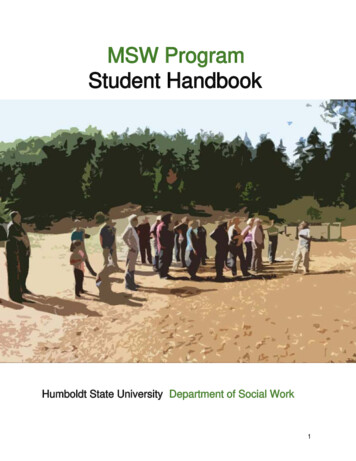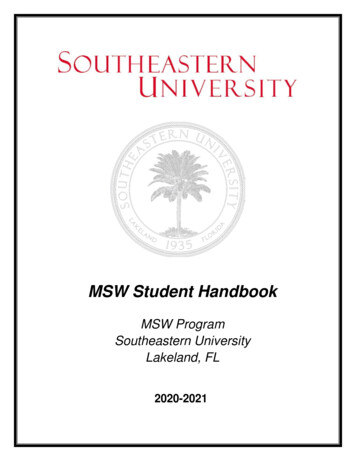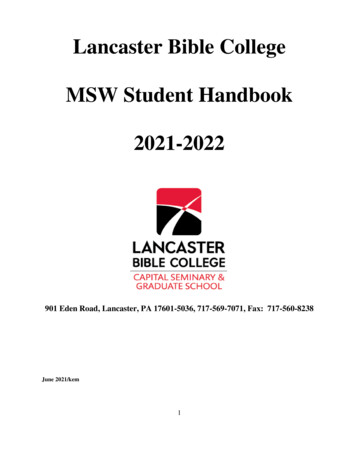
Transcription
Lancaster Bible CollegeMSW Student Handbook2021-2022901 Eden Road, Lancaster, PA 17601-5036, 717-569-7071, Fax: 717-560-8238June 2021/kem1
Table of ContentsSubjectPage NumberIntroduction3MSW Program Overview5MSW Program Accreditation Process5LBC Capital Mission and Goals6Counseling and Social Work Department Goals6MSW Program Mission and Goals7Generalist Social Work Practice10Strengths-Based Distinctive11LBC Capital Statement of Faith11Unique Features of the MSW Program13MSW Program Student Learning Outcomes14Generalist Social Work Competencies and Behaviors14Clinical Social Work Competencies and Behaviors16Advanced Child Welfare Practice Competencies and Behaviors21MSW Program Coursework26Generalist MSW Course Descriptions30Specialized MSW Curriculum Course Descriptions: Clinical Social Work32Specialized MSW Curriculum Course Descriptions: Advanced Child Welfare34PracticeMSW Program Advising: Academic and Professional36MSW Student Professional Development Portfolio37MSW Program Admission Requirements38Transfer of Credit and Life Experience Notification40Academic Probation, Dismissals, and Appeals41MSW Program GPA Requirements43Goodness of Fit Policy44MSW Program Field Education45MSW Student Records48MSW Student’s Rights Under FERPA49MSW Program Statement of Non-Discrimination51MSW Student’s Rights to Organize52MSW Program and Assistive Technology53MSW Program Administrative Structure54Social Work Program Department Facilities54Resources to Support MSW Students55Appendices56Appendix A: MSW Program Policies57References602
IntroductionThe social work profession has origins in North America in the early twentieth century when the“friendly visitors” assisted with the care of the needy, orphaned, and those impacted by poverty.The efforts of the early supporters of social services often advocated for the local and nationalchanges to policies affecting vulnerable and oppressed populations. Through the efforts of theearly pioneers in areas such as child labor, inhumane working conditions, rights of women,injustices perpetrated on minority populations and other such reforms, the profession has grownto be a widely respected field of practice.Social work professionals work with a variety of people within many segments of society. Theywork with individuals across the lifespan, from birth to individuals at the end of life. Socialworkers address concerns across socioeconomic levels and work with individuals from diversepopulations, cultures, and backgrounds. Social work practice spans various levels of societal life:individuals, families, groups, organizations, and communitiesSocial work is a growing and thriving profession that offers a wide variety and availability ofoccupational choices. The social work profession allows students to fulfill the biblical mandatesof Matthew 24 to “care for the poor, the sick, the homeless and the least of these”. According tothe most recent publication by the Bureau of Labor Statistics (2020):Overall employment of social workers is projected to grow 13 percent from 2019to 2029, much faster than the average for all occupations. Employment growth willvary by specialization.Employment of child, family, and school social workers is projected to grow 12percent from 2019 to 2029, much faster than the average for all occupations. Childand family social workers will be needed to work with families to strengthenparenting skills, prevent child abuse, and identify alternative homes for childrenwho are unable to live with their biological families. In schools, more socialworkers will be needed as student enrollments rise. However, employment growthof child, family, and school social workers may be limited by federal, state, andlocal budget constraints.Employment of healthcare social workers is projected to grow 14 percent from2019 to 2029, much faster than the average for all occupations. Healthcare socialworkers will continue to be needed to help aging populations and their familiesadjust to new treatments, medications, and lifestyles.Employment of mental health and substance abuse social workers is projected togrow 17 percent from 2019 to 2029, much faster than the average for alloccupations. Employment will grow as more people seek treatment for mentalillness and substance abuse. In addition, drug offenders are increasingly being sentto treatment programs, which are staffed by these social workers, rather than beingsent to jail.3
Overall, job prospects should be very good, particularly for clinical social workers.The continuing growth of healthcare spending and treatment increases theopportunities for clinical social workers as compared to social workers who do notoffer treatment services.(Bureau of Labor Statistics, U.S. Department of Labor. (2020, September 16).Occupational outlook handbook: Social workers. e/social-workers.htm ).The National Association of Social Workers (NASW) has defined the profession as follows:The primary mission of the social work profession is to enhance human wellbeing and help meet the basic human needs of all people, with particular attentionto the needs and empowerment of people who are vulnerable, oppressed, andliving in poverty. A historical and defining feature of social work is theprofession’s focus on individual well-being in a social context and the well-beingof society. Fundamental to social work is attention to the environmental forcesthat create, contribute to, and address problems of living. (National Associationof Social Workers, 2017)Lancaster Bible College Capital Seminary and Graduate School (referred to as LBC CAPITAL Capital), as well as the MSW Program, is committed to the following institutional core values:offering a Bible centered education, a quality education, an environment which encouragesspiritual life and growth, a ministry and service mindset, a culture that is team-oriented, a campusclimate that is family-oriented, and institutional and operational integrity.MSW Program OverviewThe LBC Capital MSW Program prepares students to be leaders in the field of social work in awide range of settings. By developing a biblical framework, leadership skills, evidence-basedpractice, experiential learning, and ethic of self-care, students will be equipped to provideleadership in professional social service contexts. Students apply a person-in-environmentapproach to understanding human behavior. This approach drives students to synthesize humanwell-being at each point along the continuum of the helping relationship. Students use astrengths-based approach in various practice contexts including individuals, families, groups,organizations, and communities.Students in the MSW Program engage with the concept of diversity and the significance ofdiversity is woven throughout the curriculum. Valuing human diversity sets the framework forpractice within the social work context. The students expand their social work knowledge byconducting evidence-based research. This scientific and methodical approach to understandingthe complexities of the human experience is built in the coursework. Discussion pertaining to thespiritual realities of the human experience affords the community within the MSW Program tounderstand many aspects of human justice. Understanding poverty from a context whichintersects with faith challenges students’ understanding and broadens the reality of the humancondition, encouraging students to advocate for human rights in a practice context. Dynamic4
engagement in the classroom exposes students to opportunities in which rich dialogue exists toenhance their worldview.LBC Capital has been offering social work courses since 2004; however, the Program did notpursue accreditation through the Council on Social Work Education (CSWE) until 2012. Theprocess of accreditation was initiated at that time with the resulting Candidacy status granted inFebruary 2014 and continued for a second year in February 2015. The BSW Program receivedinitial accreditation through CSWE in February 2016. In 2020, the BSW Program was grantedfull accreditation through CSWE for an additional 8 years. In 2019, the BSW Program facultybegan discussions with internal and external stakeholders to determine the feasibility of offeringan MSW Program at LBC Capital. A program proposal was developed by a faculty member oneof the faculty, submitted to the Counseling and Social Work department chair for review. In June2020, this proposal was then reviewed by the Academic Council which approved the proposal. InJune 2020, the Provost approved the proposal as well and recommended review with thePresident’s Cabinet and the Educational Committee of the Trustees. On August 11, sanction wasgiven to begin the development of the MSW Program. The MSW Program is considered in PreCandidacy status with CSWE, effective December 22, 2021with the hope that Candidacy status isreceived in February of 2022 and eventual Initial Accreditation in February of 2024. Should theProgram be granted Candidacy in February of 2022, students admitted to the Program in Fall of2021 will be grandfathered into the accredited MSW degree.This handbook reflects the updated policies, practices, and information that assist students topursue an MSW degree at LBC Capital.MSW Program Accreditation ProcessLBC Capital is accredited through the Middle States Commission on Higher Education as aBible College. In addition, the institution is accredited through the Association for BiblicalHigher Education. The following approval letter has been received to offer an MSW Program atLBC Capital from the Middle States Commission on Higher Education.In October 2020, the MSW Program applied for consideration with CSWE to begin an MSWProgram. The institution received approval from CSWE through the Letter of Institutional Intentwhich is the first stage of the accreditation process. In December 2020, the Program sent theBenchmark I document to CSWE for review. This document is a comprehensive report of all theaccreditation standards as outlined by CSWE (see the accreditation section of the CSWE websiteat www.cswe.org). There are several levels of accreditation that must occur as outlined below: Pre-Candidacy status: received when initial benchmark document submitted by theProgram is approved by CSWE staff (received December 2020) Benchmark I visit by CSWE site visitor (intend to occur in Fall 2021) Candidacy status: received after site visit by CSWE and Program response (intend toreceive in February 2022). Students admitted to the Program the year in which Candidacyis received (2021-2022) will be identified as completing a CSWE-accredited program. Benchmark II visit by CSWE site visitor (intend to occur in Fall 2022) Self-Study due in Summer 2023 Initial Accreditation visit by CSWE (intend to occur in Fall 2023)5
Initial Accreditation decision by the Council on Accreditation (February meeting) (intentto occur in February 2024)LBC Capital Mission and GoalsThe mission of LBC Capital is as follows: “to educate Christian students to think and live abiblical worldview and to proclaim Christ by serving him in the Church and society.”A graduate of LBC Capital will: Demonstrate proficiency in knowing, interpreting, integrating, and applying theScriptures.Demonstrate critical thinking skills and proficiency in acquiring, evaluating,communicating, and applying information.Develop an understanding and appreciation of, and compassion toward cultures of theworld.Develop the principles necessary for a biblical worldview resulting in a dynamicunderstanding of one’s role in relation to God, self, and the world.Demonstrate an understanding and application of the knowledge and skills necessary forprofessional Christian ministry.This mission statement and the supporting core knowledge, values and skills form the basis of thestructure for the MSW Program.Counseling and Social Work Department GoalsThe MSW Program is part of a combined Counseling and Social Work Department. Thisdepartment encourages students to understand, evaluate, and practice counseling and social worktheory and methods from a biblical perspective. The mission of the Counseling and Social WorkDepartment is to educate the whole person from a biblical worldview in knowledge of theory andpractice—synthesizing learning into direct practice. The specific objectives of the Departmentare as follows: Synthesize scientific research and literature that applies and relates to future professionalwork.Integrate academic learning and interpersonal therapeutic skills through engagement inpractice field settings.Critically evaluate standard theories and methods from a biblical perspective.Appropriately apply ethical principles to direct service.Assess personal assets and liabilities for professional work to maximize effectiveness.Acquire knowledge and ability to assess clients to establish appropriate treatment goalsand methodology.6
MSW Program Mission and GoalsSpecifically, the MSW Program mission and goals parallel those of the larger department andinstitution in which the program exists. The mission of the Social Work Program is as follows:The Lancaster Bible College Master of Social Work program exists to equipgraduate social work students to serve society and the Church through advancedsocial work practice within the purpose and values of the social work professionand the context of a biblical worldview.To achieve this mission, the Social Work Program at LBC Capital integrates the purposes andvalues of the Social Work profession with a biblical worldview which is the program’s context.The Social Work Program at LBC Capital applies the Educational Policy and AccreditationStandards (2015) from the Council on Social Work Education as a foundation or framework to setthe course for academic learning for the students.The purpose of the social work profession is to promote human and communitywell-being. Guided by a person and environment construct, a global perspective,respect for human diversity, and knowledge based on scientific inquiry, socialwork’s purpose is actualized through its quest for social and economic justice, theprevention of conditions that limit human rights, the elimination of poverty, andthe enhancement of the quality of life for all persons. (CSWE, 2015, p.5)Students at LBC Capital develops a biblical worldview as the contextual framework for serviceto others within society and the Church. A biblical worldview provides a lens through which theworld is interpreted. It informs our understanding, perspective and approach to life, people andproblems. A biblical worldview provides a building block for helping in the social sciences.When there are discussions about poverty, helping the widows or orphans or meeting the needs ofothers, the Bible provides guidance, direction about the value of these pursuits, and the benefitthat it has for communities. A biblical worldview focuses on the needs of others and encouragesa desire to pursue God, not individual advancement. Sherwood (2002) indicates, “worldviewsgive faith-based answers to a set of ultimate and grounding questions. Everyone operates based onsome worldview or faith-based understanding of the universe and persons-examined orunexamined, implicit or explicit, simplistic or sophisticated” (p. 9)The following diagram assists in generally understanding a biblical worldview and theintersection of work with individuals, families, groups, organizations, and communities:7
BiblicalWorldviewValuesBehaviorsThe LBC Capital’s MSW program will offer students a variety of learning opportunities topractice advanced social work from a biblical worldview. The program prepares graduatestudents to integrate biblical principles of love, care, compassion, service, addressing injustice,and many other values that focus on preserving the dignity and worth of individuals andadvancing social justice.Students in the LBC Capital’s MSW program will be encouraged to engage in leadership rolesboth at the mezzo and macro levels. The biblical worldview solidifies (encourages) students topractice serving others with great love, service, care and compassion shown to others, focused onlocal and global interactions.Students integrate into their practice a biblical worldview with the core values of social work.The following chart outlines ideas about how this is accomplished:Core Value of Social WorkServiceBiblical Value from WorldviewStudents use the concept of serving oneanother within the context of family, faithcommunity, and global outreach as theframework for work alongside each other(Ephesians 4:11-13). This service is an act ofhumility whereby the needs of others are ahigher priority than personal advancement(Micah 6:8).Students defend the rights of the poor andneedy and apply the value of showing mercyand justice to those who are oppressed anddowntrodden (Proverbs 31:8-9). This value ispromoted through advocacy within the Churchand society with vulnerable and oppressedpeople groups.Students display valuing difference in thecontext of their client interactions. As aresult, each person has unique value andinherent worth, created for purpose and greatpotential (Jeremiah 29:11; Psalm 139:14).Social JusticeDignity and Worth of the Person8
This value runs in the DNA of a biblicalworldview.Students engage in interactions with othersbased on their inherent view that God loves allpeople and therefore the student is to bepresent within the context of humanrelationships, developing depths ofrelationships and compassion shown to othersbecause we belong to one another (Romans12: 4-8).Students incorporate honesty and integrity inall the spheres of life, understanding theimportance of accountability to one anotherand God. Students are held to the higheststandard of integrity through academicpursuits as well as managing interpersonalconflicts that encourage students to develop ablameless walk among others (Psalm 15).Students demonstrate personal, physical,emotional, social, and spiritual well-beingthrough their graduate experience. Settingwith new knowledge, the heart is handled withgreat care as the student applies the values ofthe social work profession, while the handsare trained in advanced skills, as informationengages the total person, thus encouraging thestudent to be “equipped for every good work”(2 Timothy 3: 16-17).Importance of Human RelationshipsIntegrityCompetenceStudents are encouraged to examine their work with individuals, families, groups, organizations,and communities as an advanced practitioner. The framework of understanding work with othersystems is derived from a worldview that promotes certain values. Within the LBC CapitalMSW Program, the context of this evaluation is based on the understanding of the biblicalworldview. This worldview promotes discovery for the student solidifying their work withothers, exemplified through love, service, care and compassion shown to others within the societyand Church, focused on local and global interactions.LBC Capital’s MSW Program goals further develop the knowledge and skills in the key areas ofsocial work practice with these goals informing and guiding the program’s course development:1. Advanced Practice1.1. The Program will prepare students for advanced social work practice with individuals,families, groups, organizations, and communities.1.2. Program will develop practitioner competence in assessment, intervention, andevaluation strategies.9
1.3. The Program will prepare students to be culturally competent leaders in practice settingswith diverse populations, valuing human relationships in every context.2. AdvocacyThe Program will provide opportunities for students’ interaction with policy practice,with an emphasis on advocacy and the advancement of human rights.3. ResearchThe Program will develop evidence-based practitioners who participate in research toenhance the field of social work practice.4. LeadershipThe Program will engage students in the development of leadership skills to effect changein the micro, mezzo, and macro levels of practice.5. Integration of Faith and PracticeThe Program will prepare students in interpreting social work knowledge, values, andskills through a biblical worldview.Additionally, the NASW Code of Ethics serves as a guide document for the education ofstudents, discussed in many social work courses. The full code is found of-Ethics/Code-of-Ethics-EnglishGeneralist Social Work PracticeThe MSW Program supports advanced generalist practice (mentioned in the mission) as theemphasis for instructional design and student engagement. Utilizing the EPAS definitionof generalist practice, the Program’s mission emphasizes the importance of practice that isgrounded within the purposes and values of the profession. Additionally, this perspectiveencourages student mastery within the comprehensive contexts which a graduate from theLBC Capital MSW Program will practice. Generalist social work practice has been definedby the Council on Social Work Education (CSWE) in the following manner:Generalist practice is grounded in the liberal arts and the person-in-environmentframework. To promote human and social well-being, generalist practitioners usea range of prevention and intervention methods in their practice with diverseindividuals, families, groups, organizations, and communities based on scientificinquiry and best practices. The generalist practitioner identifies with the socialwork profession and applies ethical principles and critical thinking in practice atthe micro, mezzo, and macro levels. Generalist practitioners engage diversity intheir practice and advocate for human rights and social and economic justice.They recognize, support, and build on the strengths and resiliency of all humanbeings. They engage in research-informed practice and are proactive inresponding to the impact of context on professional practice (CSWE, 2015, p. 11).Strengths-Based Distinctive10
In addition, the Social Work Program values the Strengths-Based perspective, developed, andcommunicated by Saleebey (2002):1. Every individual, group, family, and community have strengths.2. Trauma and abuse, illness, and struggle may be injurious, but they may also be sources ofchallenge and opportunity.3. Assume that you do not know the upper limits of the capacity to grow and change and takeindividual, group, and community aspirations seriously.4. We best serve clients by collaborating with them.5. Every environment is full of resources.6. The context of caring and caregiving supports strengths and solution-finding.LBC Capital Statement of FaithSince its founding in 1933, the college has maintained an un-qualifies commitment to an historic,orthodox position on essential doctrines of the faith as expressed in this document. A statement offaith is central to the college’s identity, serving as a unifying and clarifying document in an age oftheological shifting and confusion. Hermeneutically, the college approaches Scripture from agrammatical, historical, and contextual viewpoint.THE SCRIPTURES. We believe the Scriptures of the Old Testament and the New Testamentare the Word of God and are verbally inspired of God and inerrant in the original writings. Webelieve that this inspiration extends equally and fully to all parts of the Scriptures, and that theyare the supreme and final authority in faith and life. John 17:17; Galatians 3:16; 2 Timothy 3:1617; 2 Peter 1:19-21.THE GODHEAD. We believe in one God eternally existing in three persons: the Father, the Son,and the Holy Spirit, each having precisely the same nature, attributes, and perfections. Matthew28:19–20; John 1:1-2; Acts 5:3-4; Colossians 2:9.JESUS CHRIST – HIS PERSON AND HIS WORK. We believe that the Lord Jesus Christ isfully God and fully man. He was eternally begotten of the Father, conceived by the Holy Spirit,and born of the Virgin Mary. We believe that Jesus Christ died for the sins of the whole world asthe substitutionary sacrifice, that His crucified body was raised from the dead, and that Heascended into heaven to appear before the Father as our High Priest, Advocate, andMediator. Luke 1:35; Romans 9:5; 1 Corinthians 15:1–3; Philippians 2:6-11; Colossians 1:15–17; 2:9; Hebrews 4:15; 9:24; 1 Timothy 2:5; 1 Peter 1:3; 2:24; 3:18; 1 John 2:2.THE HOLY SPIRIT. We believe that the Holy Spirit came in a special sense on the Day ofPentecost, indwelling every believer. In this age, the Holy Spirit carries out the ministries ofrestraining evil in the world; convicting people of sin, righteousness, and judgment; regeneratingand indwelling all believers; baptizing them into the Body of Christ; sealing them unto the day ofredemption; and empowering them for sanctification and service. We believe that some gifts ofthe Holy Spirit are permanent and are intended for use throughout the entire Church Age. Othergifts were temporary and were given in the Apostolic Age for the purpose of founding the church.These include the gifts of apostleship, prophecy, miracles, healings, tongues, and the11
interpretation of tongues. At the same time, we affirm that God performs miracles as He wills.John 14:16–17; 16:7–15; Romans 8:9; 1 Corinthians 6:19; 12:13, 28–30; Ephesians 2:20-22; 4:116, 30; Hebrews 2:1-4; Titus 3:5.HUMANITY. We believe God created humanity, male and female, reflecting the image andlikeness of God. Each person’s biological sex has been sovereignly appointed by God and is anirreversible aspect of his or her nature. The first human, Adam, sinned and thereby incurred thejudgment of both physical death and spiritual death which is eternal separation from God.Therefore, all human beings, with the exception of Christ Jesus, are born with a fallen nature, areaccountable for their sin, and need to be born again. Rejection of one’s God-ordained biologicalsexuality reflects a rejection of God’s plans and purposes. God has established and revealed inScripture a divine order to regulate humanity. Human institutions reflecting that order aremarriage of a man and a woman, family, and human government. Genesis 1:1,26,27; Psalm 51:5;Jeremiah 17:9; John 3:3-7; Romans 1:21-32; 3:10-12; 5:12; 1 Thessalonians 4:3; Ephesians 2:110; 1 John 1:8-10; Genesis 2:18-25; Colossians 3:18-21; Romans 13:1-7.SALVATION. We believe that salvation was provided for everyone in the whole world and wasaccomplished solely by the finished work of Christ shedding His blood upon the cross, and nowork on the part of any person can merit this salvation. Whoever believes solely in the finishedwork of Jesus Christ receives the new birth, becomes a partaker of the divine nature, and thusbecomes a child of God, once for all, forever. John 3:16; 6:37; 10:27–30; 2 Corinthians 5:14;Ephesians 2:8–9; 1 Timothy 2:3-6; 1 Peter 1:18-19, 23; 2 Peter 1:3-4.THE CHURCH. We believe the Church universal began at Pentecost with the baptism of theHoly Spirit and consists of all those who believe on the Lord Jesus Christ. Christ is the Head ofthe Church, called His Body. The local church is a body of believers in Christ who are joinedtogether under scriptural leadership for the worship of God, for edification through the Word ofGod, for prayer, for fellowship, for the proclamation of the Gospel, and for observance of theordinances of baptism and the Lord’s Supper. Matthew 16:16–18; Acts 1:4-5; 2:42–47; 11:15-16;Romans 12:5; Ephesians 1:20–23; Philippians 1:1; 1 Corinthians 12:13; 1 Timothy 3:15.THE FUTURE. We believe in the imminent return of Jesus Christ to rapture the Church Agesaints, followed by the tribulation period, and the visible return of Jesus Christ with His saints forHis millennial reign on earth. We believe in the bodily resurrection of the just and unjust, in thereward and everlasting conscious blessedness of the just, and in the judgment and everlastingconscious punishment of the lost. Luke 16:19–26; John 11:25; 1 Corinthians 15:51-57; 1Thessalonians 4:13–18; Revelation 20:1–15; 21:1–8.[Approved by the Board of Trustees of Lancaster Bible College 2.2.2005; Revised 11.18.2014(Humanity)]Unique Features of the MSW ProgramSpecializations and Levels. The MSW Program is organized to address two types ofspecialization: Clinical Social Work and Advanced Child Welfare Practice. Additionally, theProgram offers the following levels of education:12
Regular Standing (non-BSW applicants), PART-TIME (57-61 credits)o Cohorts start in Fall (odd years)o Take 6-9 credits each semester, developed for the working professionalo 32-month programo Comprised of 8 residencies which are face-to-face or synchronous intentionalinteractions with MSW facultyo Internship of 900 hours over four semesters in a social service organization,supervised by an MSW practitionero Mixture of synchronous and asynchronous courseworkRegular Standing (non-BSW applicants), FULL-TIME (57-61 credits)o Cohorts start in Fall (even years)o Take 9-15 credits each semester; developed for the working professionalo 20-month programo Comprised of 5 residences which are face-to-face or synchronous intentionalinteractions with MSW facultyo Internship of 900 hours over four semesters in a social service organization,supervised by an MSW practitionero Mixture of synchronous and asynchronous courseworkAdvanced Standing (BSW applicants from CSWE accredited school), PART-TIME(30-34 credits)o Cohorts start in Fall (every year)o Take 6-9 credits each semester; developed for the working professionalo 20-month programo Comprised of 5 residencies which are face-to-face or synchronous intentionalinteractions with MSW facultyo Internship of 500 hours over two semesters in a social service organization,supervised by an MSW practitionero Mixture of synchronous and asynchronous courseworkAdvanced Standing (BSW applicants from CSWE accredited school), FULL-TIME(30-34 credits)o Cohorts start every Januaryo Ta
Lancaster Bible College MSW Student Handbook 2021-2022 901 Eden Road, Lancaster, PA 17601-5036, 717-569-7071, Fax: 717-560-8238 . Transfer of Credit and Life Experience Notification 40 Academic Probation, Dismissals, and Appeals 41 . Lancaster Bible College Capital Seminary and Graduate School (referred to as LBC CAPITAL
